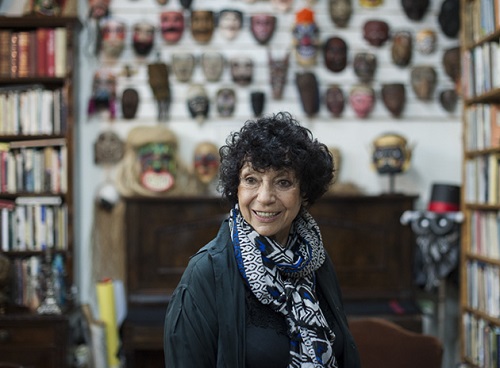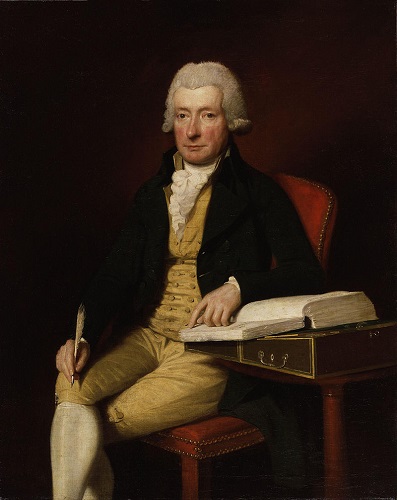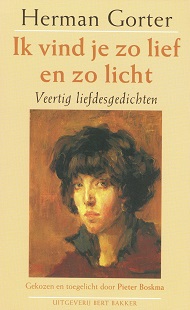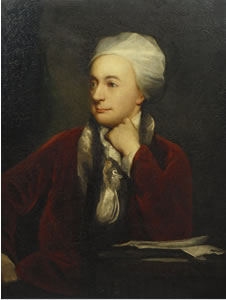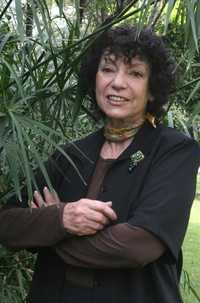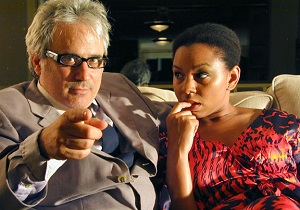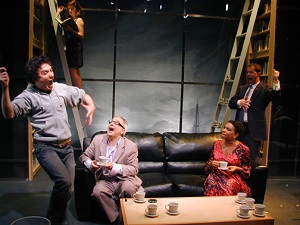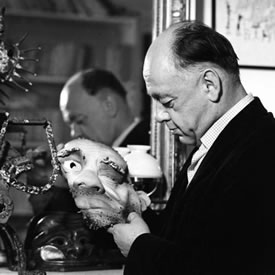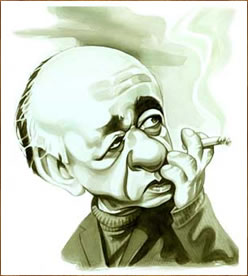De Frans-Roemeense schrijver Eugène Ionesco werd geboren op 26 november 1912 in Slatina, Roemenië. Zie ook alle tags voor Eugène Ionesco op dit blog.
Uit: La cantatrice chauve
SCENE II
Les Smith et Mary
MARY, entrant. – Je suis la bonne. J’ai passé un après-midi très agréable. J’ai été au cinéma avec un homme et j’ai vu un film avec des femmes. A la sortie du cinéma, nous sommes allés boire de l’eau-de-vie et du lait et puis on a lu le journal.
MME SMITH. – J’espère que vous avez passé un après-midi très agréable, que vous êtes allée au cinéma avec un homme et que vous avez bu de l’eau-de-vie et du lait.
M.SMITH. – Et le journal !
MARY. – Mme et M. Martin, vos invités, sont à la porte. Ils m’attendaient. Ils n’osent pas entrer tout seuls. Ils devaient dîner avec vous, ce soir.
MME SMITH. – Ah oui. Nous les attendions. Et on avait faim. Comme on ne les voyait plus venir, on allait manger sans eux. On n’a rien mangé, de toute la journée. Vous n’auriez pas dû vous absenter !
MARY. – C’est vous qui m’avez donné la permission.
M.SMITH. – On ne l’a pas fait exprès !
MARY éclate de rire. Puis, elle pleure. Elle sourit. – Je me suis acheté un pot de chambre.
MME SMITH. – Ma chère Mary, veuillez ouvrir la porte et faites entrer M. et Mme Martin, s’il vous plaît. Nous allons vite nous habiller.
Mme et M. Smith sortent à droite. Mary
Ouvre la porte à gauche par laquelle
Entrent M. et Mme Martin.
SCENE IV
Les mêmes, moins Mary.
MARY. – Pourquoi êtes-vous venus si tard ! Vous n’êtes pas polis. Il faut venir à l’heure. Compris ? Asseyez-vous quand même là, et attendez, maintenant.
Elle sort.
Eugène Ionesco (26 november 1912 – 28 maart 1994)
De Amerikaanse schrijfster Marilynne Robinson werd geboren in Sandpoint, Idaho op 26 november 1943. Zie ook alle tags voor Marilynne Robonson op dit blog.
Uit: Gilead
“I told you last night that I might be gone sometime, and you said, Where, and I said, To be with the Good Lord, and you said, Why, and I said, Because I’m old, and you said, I don’t think you’re old. And you put your hand in my hand and you said, You aren’t very old, as if that settled it. I told you you might have a very different life from mine, and from the life you’ve had with me and that would be a wonderful thing, there are many ways to live a good life. And you said, Mama already told me that. And then you said, Don’t laugh! because you thought I was laughing at you. You reached up and put your fingers on my lips and gave me that look I never in my life saw on any other face besides your mother’s. It’s a kind of furious pride, very passionate and stern. I’m always a little surprised to find my eyebrows unsinged after I’ve suffered one of those looks. I will miss them.
It seems ridiculous to suppose the dead miss anything. If you’re a grown man when you read this–it is my intention for this letter that you will read it then–I’ll have been gone a long time. I’ll know most of what there is to know about being dead, but I’ll probably keep it to myself. That seems to be the way of things.
I don’t know how many times people have asked me what death is like, sometimes when they were only an hour or two from finding out for themselves. Even when I was a very young man, people as old as I am now would ask me, hold on to my hands and look into my eyes with their old milky eyes, as if they knew I knew and they were going to make me tell them. I used to say it was like going home. We have no home in this world, I used to say, and then I’d walk back up the road to this old place and make myself a pot of coffee and a friend-egg sandwich and listen to the radio, when I got one, in the dark as often as not. Do you remember this house? I think you must, a little. I grew up in parsonages. I’ve lived in this one most of my life, and I’ve visited in a good many others, because my father’s friends and most of our relatives also lived in parsonages. And when I thought about it in those days, which wasn’t too often, I thought this was the worst of them all, the draftiest and the dreariest. Well, that was my state of mind at the time. It’s a perfectly good old house, but I was all alone in it then. And that made it seem strange to me. I didn’t feel very much at home in the world, that was a face. Now I do.
And now they say my heart is failing. The doctor used the term “angina pectoris,” which has a theological sound, like misericordia. Well, you expect these things at my age. My father died an old man, but his sisters didn’t live very long, really. So I can only be grateful. I do regret that I have almost nothing to leave you and your mother. A few old books no one else would want. I never made any money to speak of, and I never paid any attention to the money I had. It was the furthest thing from my mind that I’d be leaving a wife and child, believe me. I’d have been a better father if I’d known. I’d have set something by for you.”

Marilynne Robinson (Sandpoint, 26 november 1943)
De Engelse dichter William Cowper werd geboren op 26 november 1731 in Berkhamstead, Herford. Zie ook mijn blog van 26 november 2006 en ook mijn blog van 26 november 2008.
Light Shining out of Darkness
God moves in a mysterious way
His wonders to perform;
He plants His footsteps in the sea,
And rides upon the storm.
Deep in unfathomable mines
Of never-failing skill,
He treasures up His bright designs,
And works His sovereign will.
Ye fearful saints, fresh courage take,
The clouds ye so much dread
Are big with mercy, and shall break
In blessings on your head.
Judge not the Lord by feeble sense,
But trust Him for His grace;
Behind a frowning providence
He hides a smiling face.
His purposes will ripen fast,
Unfolding every hour;
The bud may have a bitter taste,
But sweet will be the flower.
Blind unbelief is sure to err,
And scan His work in vain:
God is His own interpreter,
And he will make it plain.
William Cowper (26 november 1731 – 25 april 1800)
De Vlaamse dichter en schrijver Louis Verbeeck werd geboren in Tessenderlo op 26 november 1932. Hij is vooral bekend van zijn cursiefjes. Verbeek studeerde Germaanse filologie aan de Katholieke Universiteit Leuven. Verschillende bundels van zijn cursiefjes werden als boek uitgegeven, en hij las ze voor op de radio. Hij presenteerde ook programma’s bij Omroep Limburg. Bovendien schreef hij verschillende kleinkunstliedjes voor Miel Cools, De Vaganten e.a.
Lief
Mijn lief heeft mij verlaten
ze gaf me plots de bons,
ze vloog naar de Karpaten
en stuurde mij een spons,
een spons voor al mijn tranen,
een waterval van Coo,
een smart voor achttien kranen
en slechts één lavabo.
Mijn traanzakjes vol pijlen
en géén die erop let,
ik moet nog leren zeilen
want ik dobber in mijn bed
Louis Verbeeck (Tessenderlo, 26 november 1932)
De Argentijnse schrijfster Luisa Valenzuela werd geboren op 26 november 1938 in Buenos Aires. Zij publiceerde haar eerste werk toen zij 17 jaar was. Toen zij twintig was trouwde zij met een Franse zakenman, trok naar Parijs en begon zij te werken voor de Franse radio. Ook leerde zij in die tijd mensen kennen uit de groepen rond Tel Quel en de Noeveau Roman. Ook schreef zij in Parijs haar eerste roman Hay que sonreír. Zij moest Argentinie in 1979 verruilen voor de Verenigde Staten, waar ze als journaliste werkte. Ze schreef daarnaast vanaf 1967 verhalenbundels en romans.
Uit: Feuer am Wort (Vertaald door Helga Lion, Erika Pfeiffer e.a.)
“Am Samstag Abend sucht eine Frau alles Mögliche, nur nicht Arbeit. Und an einem Tisch nahe der Theke sitzend, so wie man mir s empfohlen hat, warte ich. In diesem Lokal ist die Theke die Schlüsselstelle, hat man mir eingebläut, so können dich die Männer taxieren, wenn sie in Richtung Klo gehen. Denn sie können sich diesen Luxus sehr wohl leisten. Von ihrem Drang getrieben, stoßen sie die Schwingtür kraftvoll auf, eine Wolke von Ammoniakduft schlägt uns entgegen, und sie kommen erleichtert wieder hervor, bereit, den Tanz wieder aufzunehmen. Als Prinz mag er ja seine Schwächen haben, doch für einen Frosch, das weiß er, ist er ganz große Klasse. Dennoch ist er traurig. Das Mädchen, das ihn küsste, ist nicht mehr von dieser Welt. Damals wollte der Prinz keine Zeugin seiner Verwandlung hinterlassen, aber jetzt tut es ihm Leid. Es gibt nun niemanden mehr im Schloss, der ihm von seiner Vergangenheit erzählen könnte, dabei ist es so wichtig für ihn, immer wieder vom Teich zu hören und vom unaufhörlichen Quaken: Denn auf die Stimme kommt es an. Für die Liebe – besser gesagt, für die Fortpflanzung – braucht man ein kräftiges Vibrato in der exakten Tonhöhe der eigenen Spezies. Und sie war so, sie lag genau auf seiner Wellenlänge und wusste sofort, was er von ihr wollte. Sie verstand ihn, und ohne lang zu überlegen gab sie seinem Flehen nach und küsste ihn. Wegen dieser spontanen Handlung kam sie nicht mehr dazu, die Geschichte zu erzählen.”

Luisa Valenzuela (Buenos Aires, 26 november 1938)
Onafhankelijk van geboortedata:
De Duitse schrijver René Becher werd geboren in 1977 in Bayreuth. Hij studeerde germanistiek, geschiedenis en boekwetenschappen in Mainz en Düsseldorf. Daarna studeerde hij aan het Deutsche Literaturinstitut Leipzig. In 2004 won hij een prijs bij de Berliner open mike. Hij publiceerde in bloemlezingen en literaire tijdschriften. In het voorjaar van 2008 verscheen Etzadla, een verhaal, bij de
Ploettner Verlag Leipzig.
Uit: Etzadla
»‘Aufgepasst, Sportsfreund, etzadla stinkt’s!’
Und Vater bewegte sein Rad an der heimischen Kläranlage vorbei, ich kam doch kaum hinterher. Scheiße! Vater musste lachen, hielt sich den ärmel vor die Nase, seine roten Haare, sie bewegten sich im Wind. Und Vater schwieg sich aus. Möchte fast sagen: Vater schwieg wie ein Grab. Sagte nur: „Schau halt, echter Nelkenwurz.“ Und schlug in seinem Wald- und Wiesenbuch nach, weil ihm die eigenen Worte dafür fehlten.
Er verschränkte die Arme hinter dem Kopf, vor uns der Gabentisch, das Schweizermesser, es steckte in einem Hartkäsestück.
Der aufgeschraubte, stoßfeste Freund, Vater trank daraus. Eine Fritfliege vor dem offenen stinkenden Vatermund, verschwand wieder, machte sich auf und davon. …
über den hell erleuchteten Marktplatz unseres an sich recht schönen Städtchens. Der Flötist mit den Scheuklappen, der vor dem Warenhaus sitzt, eine Schande, eine Lachnummer, nicht der Rede wert. Krankhafte Töne, ich sehe nicht, höre nicht und diene nicht. Ein Katzenviech auf dem Fensterbrett, klopft mit dem Schwanz einen viel zu schnellen Takt. Ein Mann mit Krückstock verteilt in einer schattigen Ecke fruchtige Bonbons an Kinder. Eine alte Frau versohlt einen schmutzigen Ausläufer. Wie Vater mich doch öfter versohlt hat, wenn ich nicht spurte, wie er dann meinte, griff nach einem Hausschlappen, einer kleinen Schaufel, je nachdem, was grad zur Hand und. …
Vater grüßte. Die Leute grüßten zurück. Vater kannte diese Menschen. Er stieg vom Rad und sagte: ‘Du bist doch der’, und bekam zur Antwort:’Immer noch.’ ‘Mit dem Herrn Sohnemann unterwegs?’ Und sie traten auf meinen Schatten und erzählten mir Geschichten, die ich mir einfach nicht merken konnte.“
René Becher (Bayreuth, 1977)
